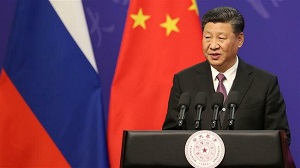Chinese President Xi Jinping says the US campaign of “extreme” pressure and unilateral sanctions against Iran are to blame for a rise in tensions in the Middle East region.
Xi made the remarks in a joint interview with Russia’s TASS news agency and Rossiyskaya Gazeta newspaper on Wednesday ahead of his state visit to Russia.
Tensions have continued to rise in the Middle East as a result of Washington’s unilateral sanctions and “extreme pressure” on Tehran, Xi said, according to a transcript of the interview published by China’s Foreign Ministry. “The development of the situation is worrying.”
The US recently took a quasi-warlike posture against Iran when it dispatched an aircraft carrier strike group, a bomber task force, and an amphibious assault ship to the Arab Gulf, citing an alleged Iranian threat.
Iran said it posed no threat to anyone but would defend itself against any aggression.
The US-Iran face-off began last year, when Washington unilaterally withdrew from an international nuclear deal with Iran and unleashed the “toughest ever” sanctions against Tehran, notably targeting its energy sector.
In April, the White House terminated sanctions waivers for major buyers of crude from the Islamic Republic in an attempt to bring Iran’s oil exports to “zero.”
China – the top buyer of Iranian oil — complained to the US over its decision to end sanctions waivers on Iranian oil imports, saying its dealings with the Islamic Republic are “reasonable and legitimate” and should be respected.
In his interview, Xi appeared to allude to the Iran oil sanctions, saying, “China will continue to firmly safeguard its own legitimate and lawful rights and interests.”
Elsewhere in his interview, the Chinese president underlined the crucial importance of the 2015 Iran nuclear deal for peace and stability in the Middle East as well as non-proliferation, stressing that the accord should be fully implemented and respected.
He further noted that Beijing and Moscow – both signatories to the deal -share a “highly aligned” stance on the Iran nuclear issue and support dialog in that regard.
“China and Russia’s views and positions on the Iran nuclear issue are highly aligned, and both hope that all relevant parties remain rational and exercise restraint, step up dialogue and consultations and lower the temperature on the present tense situation,” he said.
PRESS T.V
R.S

